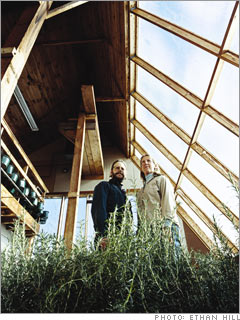Dave Colson, a spare man with a well-trimmed folksinger's beard and a dusty seed-catalog cap, doesn't seem like a talkative sort. But Colson, 50, and wife Chris, 55, are full of questions today. For more than 20 years the couple has been coaxing organic micro-crops - tomatoes, squash and herbs - out of the nine cultivated acres of glacial soil that make up a portion of their New Leaf Farm in Durham, Maine, and todayis their first meeting with Susan Phinney.
As Whole Foods' first full-time "forager," Phinney, 46, is tasked with finding and then helping small farmers, bakers and other food providers cope with the exacting demands of the huge organic grocery chain. She voices an uplifting corporate mantra: "We think your products are great, and I'm here to see whether we can build a business together." Whole Foods, with annual sales of $5.6 billion, is about to open its first market in Maine. The new store should be a natural outlet for the Colsons. But they wonder whether they can sell their produce to a big supermarket without sacrificing their souls - and their bottom line.
On the face of it, the opportunity is enormous. The Organic Trade Association, a professional trade group located in Greenfield, Mass., estimates that the organic food market is growing more than 16 percent a year and, at $16 billion, now represents close to 3 percent of all U.S. food sales. That kind of growth can be a bonanza for the thousands of small-scale farmers and food entrepreneurs who hoe and grow, bake and bottle: Getting into a Whole Foods Market can put a business on an entirely new scale. Cindy Elder, one of Phinney's first foraging finds, makes Bristol Harbor Homemade natural gourmet cookie and muffin mixes in a small, clean shop next to a gas station on the main road in Bristol, R.I. "Being on the shelf at Whole Foods gives you instant credibility," she says.
| |

